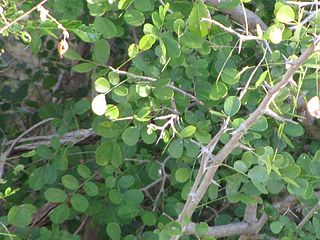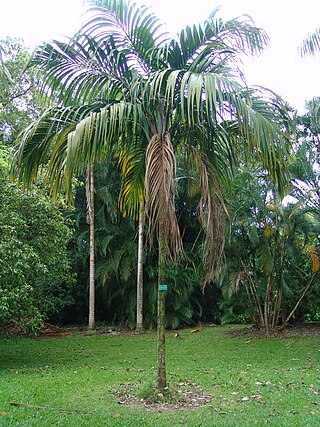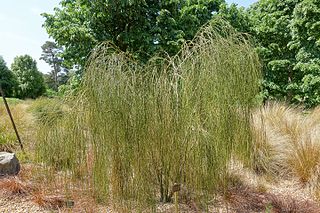
Dalbergia melanoxylon is a flowering plant in the family Fabaceae, native to seasonally dry regions of Africa from Senegal east to Eritrea and south to the north-eastern parts of South Africa. The tree is an important timber species in its native areas; it is used in the manufacture of musical instruments and fine furniture. Populations and genomic resources for genetic biodiversity maintenance in parts of its native range are threatened by overharvesting due to poor or absent conservation planning and by the species' low germination rates.

Gomortega keule is a tree native to Chile. It is the sole species of the genus Gomortega and, according to the APG IV system of 2016, of the monotypic family Gomortegaceae, assigned to the order Laurales in the clade magnoliids.

The Santa Cruz cypress is a species of North American tree within the Cypress family. The species is endemic to the Santa Cruz Mountains within the Santa Cruz and San Mateo counties of west-central California. The U.S. Fish and Wildlife Service listed the species on the Endangered Species Act in 1987 due to increasing threats from habitat loss and disruption of natural forest fire regimes. In 2016, the conservation status of the Santa Cruz cypress changed to Threatened. The cited reasoning was a decrease in threats against their habitat.

An IUCN Red List Critically Endangered species is one that has been categorized by the International Union for Conservation of Nature as facing an extremely high risk of extinction in the wild. As of 2021, of the 120,372 species currently tracked by the IUCN, there are 8,404 species that are considered to be Critically Endangered.

The Oʻahu ʻalauahio, also known as the Oʻahu creeper, is a small finch-like Hawaiian honeycreeper that is endemic to the Hawaiian island of Oahu. It is probably extinct.

Carpoxylon macrospermum is a species of palm tree endemic to Vanuatu, and the only species in the genus Carpoxylon.

Juania australis, the Chonta palm, is a species of flowering plant in the family Arecaceae, the only species in the genus Juania. It is a solitary trunked palm tree which is endemic to the Juan Fernández Islands archipelago in the southeast Pacific Ocean west of Chile.

Jubaeopsis caffra, the Pondoland palm, is a flowering plant species in the palm family (Arecaceae). It belongs to the monotypic genus Jubaeopsis.

Nephrosperma vanhoutteanum is a species of palm tree, and the only species in the genus Nephrosperma. It is found only in Seychelles, where it is threatened by habitat loss.
Tectiphiala ferox, or palmiste bouglé, is a species of flowering plant in the family Arecaceae. It is endemic to Mauritius.

Dactyladenia cinerea is a species of plant in the family Chrysobalanaceae. It is endemic to Cameroon. It is threatened by habitat loss.
Dactyladenia eketensis is a species of plant in the family Chrysobalanaceae. It is endemic to Nigeria. It is threatened by habitat loss.
Melicope zahlbruckneri, with the common names Zahlbruckner's melicope, Zahlbruckner's pelea, and kipuka piaula, is a species of tree in the family Rutaceae.

Ocotea porosa, commonly called imbuia or Brazilian walnut, is a species of plant in the Lauraceae family. Its wood is very hard, and it is a major commercial timber species in Brazil.
Melicope remyi, synonym Platydesma remyi, the Hawai'i pilo kea, is a species of plant in the family Rutaceae. It is endemic to the island of Hawaii. It is threatened by habitat loss. It is on the IUCN Red List of Endangered species.
Lijndenia barteri is a species of shrub in the family Melastomataceae. It is endemic to lowland Upper Guinean forests of West Africa. It is threatened by habitat loss.
Terminalia ivorensis is a species of tree in the family Combretaceae, and is known by the common names of Ivory Coast almond, idigbo, black afara, framire and emeri.

A vulnerable species is a species which has been categorized by the International Union for Conservation of Nature as being threatened with extinction unless the circumstances that are threatening its survival and reproduction improve.

Carmichaelia stevensonii, the cord broom or weeping broom, is a species of plant in the family Fabaceae. It is found only in the north east of the South Island of New Zealand. It is threatened by habitat loss.
Dactyladenia mannii is a species of plant in the family Chrysobalanaceae. It is endemic to Cameroon and Equatorial Guinea. It is threatened by habitat loss.












